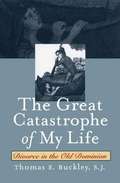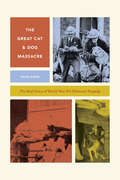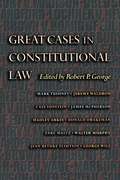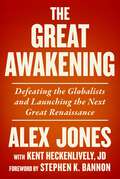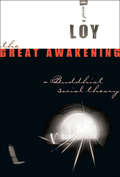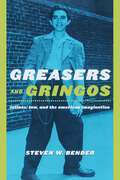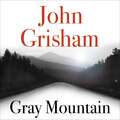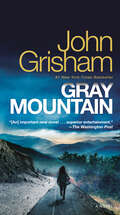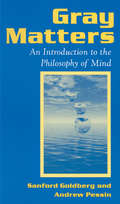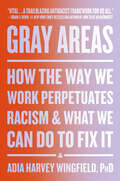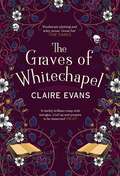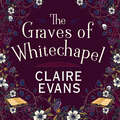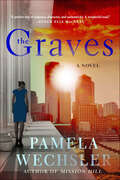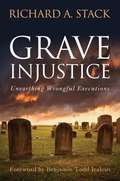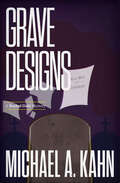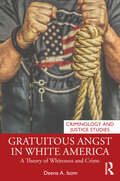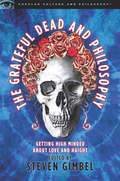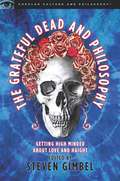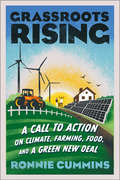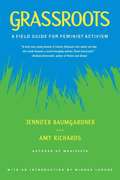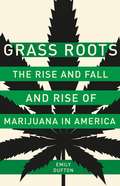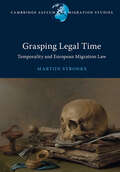- Table View
- List View
The Great Catastrophe of My Life
by Thomas E. BuckleyFrom the end of the Revolution until 1851, the Virginia legislature granted most divorces in the state. It granted divorces rarely, however, turning down two-thirds of those who petitioned for them. Men and women who sought release from unhappy marriages faced a harsh legal system buttressed by the political, religious, and communal cultures of southern life. Through the lens of this hostile environment, Thomas Buckley explores with sympathy the lives and legal struggles of those who challenged it.Based on research in almost 500 divorce files, The Great Catastrophe of My Life involves a wide cross-section of Virginians. Their stories expose southern attitudes and practices involving a spectrum of issues from marriage and family life to gender relations, interracial sex, adultery, desertion, and domestic violence. Although the oppressive legal regime these husbands and wives battled has passed away, the emotions behind their efforts to dissolve the bonds of marriage still resonate strongly.
The Great Cat and Dog Massacre: The Real Story of World War Two's Unknown Tragedy (Animal Lives Ser.)
by Hilda KeanThe tragedies of World War II are well known. But at least one has been forgotten: in September 1939, four hundred thousand cats and dogs were massacred in Britain. The government, vets, and animal charities all advised against this killing. So why would thousands of British citizens line up to voluntarily euthanize household pets? In The Great Cat and Dog Massacre, Hilda Kean unearths the history, piecing together the compelling story of the life—and death—of Britain’s wartime animal companions. She explains that fear of imminent Nazi bombing and the desire to do something to prepare for war led Britons to sew blackout curtains, dig up flower beds for vegetable patches, send their children away to the countryside—and kill the family pet, in theory sparing them the suffering of a bombing raid. Kean’s narrative is gripping, unfolding through stories of shared experiences of bombing, food restrictions, sheltering, and mutual support. Soon pets became key to the war effort, providing emotional assistance and helping people to survive—a contribution for which the animals gained government recognition. Drawing extensively on new research from animal charities, state archives, diaries, and family stories, Kean does more than tell a virtually forgotten story. She complicates our understanding of World War II as a “good war” fought by a nation of “good” people. Accessibly written and generously illustrated, Kean’s account of this forgotten aspect of British history moves animals to center stage—forcing us to rethink our assumptions about ourselves and the animals with whom we share our homes.
Great Cases in Constitutional Law
by Robert P. GeorgeSlavery, segregation, abortion, workers' rights, the power of the courts. These issues have been at the heart of the greatest constitutional controversies in American history. And in this concise and thought-provoking volume, some of today's most distinguished legal scholars and commentators explain for a general audience how five landmark Supreme Court cases centered on those controversies shaped the country's destiny and continue to affect us even now. The book is a profound exploration of the Supreme Court's importance to America's social and political life. It is also, as many of the contributors show, an intriguing reflection of what some have seen as an important trend in legal scholarship away from an uncritical belief in the essentially benign nature of judicial power. Robert George opens with an illuminating survey of the themes that unite and divide the five cases. Other contributors then examine each case in detail through a lively commentary-and-response format. Mark Tushnet and Jeremy Waldron exchange views on Marbury v. Madison, the pivotal 1803 case that established the power of the courts to invalidate legislation. Cass Sunstein and James McPherson discuss Dred Scott v. Sandford (1857), the notorious case that confirmed the rights of slaveowners, declared that black people could not be American citizens, and is often seen as a cause of the Civil War. Hadley Arkes and Donald Drakeman explore the legacy of Lochner v. New York (1905), a case that ushered in decades of judicial hostility to social welfare laws. Earl Maltz and Walter Murphy assess Brown v. Topeka Board of Education (1954), the famous case that ended racial segregation in public schools. Finally, Jean Bethke Elshtain and George Will tackle Roe v. Wade (1973), still a flashpoint a quarter of a century later in the debate over abortion. While some of the contributors show sympathy for strong judicial interventions on social issues, many across the ideological spectrum are sharply critical of judicial activism. A compelling introduction to the greatest cases in U.S. constitutional law, this is also an enlightening glimpse of the state of the art in American legal scholarship.
The Great Awakening: Defeating the Globalists and Launching the Next Great Renaissance
by Alex Jones Kent HeckenlivelyIn The Great Awakening: Defeating the Globalists and Launching the Next Great Renaissance, the most persecuted man on Earth, Alex Jones, gives you the good news about the failing plans of the globalists to control humanity. The expression &“Get woke, go broke&” has entered the common lexicon as we&’ve seen company after company invoke the false gods of diversity, equity, and inclusion to their financial demise. But this surface discussion masks a much darker truth. What we are witnessing is nothing less than the failed plans of social Darwinists to capture free market capitalism and turn it toward their fascist aims of controlling and depopulating the globe. Working with New York Times bestselling author Kent Heckenlively, Jones masterfully gives you the deeper discussion about such hot button topics as the truth behind the globalists plans for artificial intelligence (AI), the central bank digital currency, social credit scores, Big Tech tyranny, censorship, fifteen-minute cities, the unholy alliance between big business and big government, the military-intelligence-industrial complex—which is hell-bent on eternal war—and the all-out assault on free speech and the Second Amendment. The good news is that these plans are destined to fail, if we wake up to the anti-human future the globalists have planned for us. The globalists hate freedom, and what they hate the most is the greatest freedom document in human history, the United States Constitution. Jones does not shy away from the darker parts of American history—the way we have been systematically deceived by the intelligence agencies since their assassination of President John F. Kennedy—but he provides example after example of people who have broken free from the matrix of lies to tell the truth. The people the globalists fear the most are the members of their own systems of control, who wake up and then decide to act against the machine. The globalists believe they&’ve planned for every possible contingency, but they hadn&’t counted on the conscience and love of truth, which lives in the souls of good people. St. Augustine once wrote: &“The truth is like a lion; you don&’t have to defend it. Let it loose; it will defend itself.&” No figure in our modern times has roared louder against the enemies of freedom than Alex Jones. In the calm and dispassionate style that made his first book, The Great Reset: And the War for the World, such a smash hit, Alex lays out the flaws in the plans of the globalists and how they seek to create a world in direct opposition to God&’s plans for our glorious human future. But God consistently works His will in our world, even through imperfect individuals like Donald Trump, Alex Jones, or you. If you want to read one book this year to understand your world and help lead humanity to the next great human renaissance, you need to order this book today.
The Great Awakening
by David R. LoyThe most essential insight that Buddhism offers is that all our individual suffering arises from three and only three sources, known in Buddhism as the three poisons: greed, ill-will, and delusion. In The Great Awakening, scholar and Zen teacher David Loy examines how these three poisons, embodied in society's institutions, lie at the root of all social maladies as well. The teachings of Buddhism present a way that the individual can counteract these to alleviate personal suffering, and in the The Great Awakening Loy boldly examines how these teachings can be applied to institutions and even whole cultures for the alleviation of suffering on a collective level. This book will help both Buddhists and non-Buddhists to realize the social importance of Buddhist teachings, while providing a theoretical framework for socially engaged members of society to apply their spiritual principles to collective social issues. The Great Awakening shows how Buddhism can help our postmodern world develop liberative possibilities otherwise obscured by the anti-religious bias of so much contemporary social theory.
Great Australian Dissents
by Andrew LynchWhen judges disagree, those in the minority write a dissenting opinion. This book considers the great dissents in Australian law. Their worth may derive from numerous factors, including their rhetorical force as a piece of legal reasoning or emotive power as a judicial lament for the 'error' into which the majority has fallen; the general importance of the issue at stake; as a challenge to the orthodoxy; and, sometimes, the subsequent recognition of a dissenting opinion's correctness and its ultimate vindication. On some occasions, all these features may be strongly present, on others only some. Through a diverse selection of memorable dissenting opinions, this book illuminates the topic of judicial disagreement more generally - not only through examples of instances when minority opinions have been distinctly valuable, but by drawing out a richer understanding of the attributes and circumstances which lead some dissents to become iconic, while so many lie forgotten.
Greasers and Gringos: Latinos, Law, and the American Imagination (Critical America #8)
by Steven W. BenderAlthough the origin of the term "greaser" is debated, its derogatory meaning never has been. From silent movies like The Greaser's Revenge (1914) and The Girl and the Greaser (1913) with villainous title characters, to John Steinbeck's portrayals of Latinos as lazy, drunken, and shiftless in his 1935 novel Tortilla Flat, to the image of violent, criminal, drug-using gang members of East LA, negative stereotypes of Latinos/as have been plentiful in American popular culture far before Latinos/as became the most populous minority group in the U.S.In Greasers and Gringos, Steven W. Bender examines and surveys these stereotypes and their evolution, paying close attention to the role of mass media in their perpetuation. Focusing on the intersection between stereotypes and the law, Bender reveals how these negative images have contributed significantly to the often unfair treatment of Latino/as under American law by the American legal system. He looks at the way demeaning constructions of Latinos/as influence their legal treatment by police, prosecutors, juries, teachers, voters, and vigilantes. He also shows how, by internalizing negative social images, Latinos/as and other subordinated groups view themselves and each other as inferior. Although fighting against cultural stereotypes can be a daunting task, Bender reminds us that, while hard to break, they do not have to be permanent. Greasers and Gringos begins the charge of debunking existing stereotypes and implores all Americans to re-imagine Latinos/as as legal and social equals.
Gray Mountain: A Bestselling Thrilling, Fast-Paced Suspense Story
by John Grisham'No one does it better than Grisham' - TelegraphDonovan Gray is ruthless and fearless. Just the kind of lawyer you need, deep in small-town Appalachia.Samantha Kofer is a world away from her former life at New York's biggest law firm. If she is going to survive in coal country, she needs to start learning fast.Because as Donovan knows only too well, the mountains have their own laws. And standing up for the truth means putting your life on the line . . .What readers are saying about GRAY MOUNTAIN'The worst kind of corporate exploitation of the poor in rural areas is exposed . . . Absolute suspense and drama filled the pages' - 5 STARS'Such a good read' - 5 STARS'Thoroughly enjoyed every word, sentence and page!' - 5 STARS 350+ million copies, 45 languages, 9 blockbuster films:NO ONE WRITES DRAMA LIKE JOHN GRISHAM
Gray Mountain: A Bestselling Thrilling, Fast-Paced Suspense Story
by John GrishamAmerica's greatest storyteller brings us a new masterpiece of legal courage and gripping suspense - and his finest heroine since The Pelican Brief.Donovan Gray is ruthless and fearless. Just the kind of lawyer you need, deep in small-town Appalachia.Samantha Kofer is a world away from her former life at New York's biggest law firm. If she is going to survive in coal country, she needs to start learning fast.Because as Donovan knows only too well, the mountains have their own laws. And standing up for the truth means putting your life on the line . . .(P)2014 Random House Audio Inc
Gray Mountain: A Novel
by John Grisham#1 NEW YORK TIMES BESTSELLER • John Grisham has a new hero ... and she&’s full of surprises. The year is 2008 and Samantha Kofer&’s career at a huge Wall Street law firm is on the fast track—until the recession hits and she is downsized, furloughed, and escorted out of the building. Samantha, though, is offered an opportunity to work at a legal aid clinic for one year without pay, all for a slim chance of getting rehired. In a matter of days Samantha moves from Manhattan to Brady, Virginia, population 2,200, in the heart of Appalachia, a part of the world she has only read about. Samantha&’s new job takes her into the murky and dangerous world of coal mining, where laws are often broken, communities are divided, and the land itself is under attack. But some of the locals aren&’t so thrilled to have a big-city lawyer in town, and within weeks Samantha is engulfed in litigation that turns deadly. Because like most small towns, Brady harbors big secrets that some will kill to conceal.Don&’t miss John Grisham&’s new book, THE EXCHANGE: AFTER THE FIRM!
Gray Matters: Introduction to the Philosophy of Mind
by Andrew Pessin Sanford GoldbergGray Matters is a thorough examination of the main topics in recent philosophy of mind. It aims at surveying a broad range of issues, not all of which can be subsumed under one position or one philosopher's theory. In this way, the authors avoid neglecting interesting issues out of allegiance to a given theory of mind.
Gray Areas: How the Way We Work Perpetuates Racism and What We Can Do to Fix It
by Adia Harvey WingfieldGray Areas has descriptive copy which is not yet available from the Publisher.
The Graves of Whitechapel: A darkly atmospheric historical crime thriller set in Victorian London
by Claire Evans'An enthralling read' -- DAILY MAILIn the gripping new novel by the author of The Fourteenth Letter, a lawyer in Victorian London must find a man he got off a murder charge - and who seems to have killed again . . . Victorian London, 1882.Five years ago, crusading lawyer Cage Lackmann successfully defended Moses Pickering against a charge of murder. Now, a body is found bearing all the disturbing hallmarks of that victim - and Pickering is missing. Cage's reputation is in tatters, and worse, he is implicated in this new murder by the bitter detective who led the first failed case. Left with no other alternative, Cage must find Pickering to prove his innocence. Did Cage free a brutal murderer? Or is there something more sinister at work?PRAISE FOR CLAIRE EVANS'A darkly brilliant romp packed with intrigue and romance . . . curl up and prepare to become immersed'Heat'Exuberant plotting and witty prose. Great fun'The Times'Claire Evans has created a cast of deliciously sinister and mysterious characters. A hugely satisfying read'Good Housekeeping'If you enjoyed Kate Mosse's Labyrinth or Jessie Burton's The Miniaturist, then chances are you're going to love this new thriller' Hello Magazine
The Graves of Whitechapel: A darkly atmospheric historical crime thriller set in Victorian London
by Claire Evans'An enthralling read' -- DAILY MAILIn the gripping new novel by the author of The Fourteenth Letter, a lawyer in Victorian London must find a man he got off a murder charge - and who seems to have killed again . . . Victorian London, 1882.Five years ago, crusading lawyer Cage Lackmann successfully defended Moses Pickering against a charge of murder. Now, a body is found bearing all the disturbing hallmarks of that victim - and Pickering is missing. Cage's reputation is in tatters, and worse, he is implicated in this new murder by the bitter detective who led the first failed case. Left with no other alternative, Cage must find Pickering to prove his innocence. Did Cage free a brutal murderer? Or is there something more sinister at work?PRAISE FOR CLAIRE EVANS'A darkly brilliant romp packed with intrigue and romance . . . curl up and prepare to become immersed'Heat'Exuberant plotting and witty prose. Great fun'The Times'Claire Evans has created a cast of deliciously sinister and mysterious characters. A hugely satisfying read'Good Housekeeping'If you enjoyed Kate Mosse's Labyrinth or Jessie Burton's The Miniaturist, then chances are you're going to love this new thriller' Hello Magazine
The Graves: A Novel (The Abby Endicott Novels #2)
by Pamela WechslerAbby Endicott, the chief of the District Attorney’s homicide unit in Boston, returns in the heart-racing follow-up to Mission Hill. Things are looking good for Abby: she’s top pick to be the next District Attorney, and her musician boyfriend Ty has moved in, despite her upper crust family’s objections. But a serial killer is on the loose, and with two college-aged girls dead and another missing, time is running out. When the sons of a prominent government official are linked to the murders, Abby pushes back, stopping at nothing to find justice for the girls. This time, the killer could be right under her nose, and she may be the next victim.In The Graves, former prosecutor turned television writer Pamela Wechsler delivers a tense and enthralling Boston-set thriller about the intersection of power, privilege, and justice.
Grave Injustice: Unearthing Wrongful Executions
by Richard A. StackOn September 21, 2011, the controversial execution of Georgia inmate Troy Davis, who spent twenty years on death row for a crime he most likely did not commit, revealed the complexity of death penalty trials, the flaws in America’s justice system, and the rift between those who are for or against the death penalty. Davis’s execution reignited a long-standing debate about whether the death penalty is an appropriate form of justice. In Grave Injustice Richard A. Stack seeks to advance the anti–death penalty argument by examining the cases of individuals who, like Davis, have been executed but are likely innocent. By telling the stories of Jesse Tafero, Ruben Cantu, Carlos DeLuna, Cameron Todd Willingham, Larry Griffin, and others, Stack puts a human face on the ultimate and irrevocable tragedy of capital punishment. Although polls indicate Americans favor death sentences approximately three to one, many respondents change their position when presented with the facts about capital punishment. Stack’s compelling descriptions of nineteen wrongful executions illustrate the flaws of the death penalty, which, he argues, is ineffective in deterring crime and costs more than sentences of life without parole. He demonstrates that racial disparities in implementation, procedural errors, incompetent defense attorneys, and mistaken eyewitness identification lead to an alarming number of wrongful convictions. But influencing public opinion is only part of the battle to end state-sanctioned killing. Stack profiles six anti–death penalty warriors, demonstrating the range of what can be done, and what remains to be done, to move toward a more compassionate society.
Grave Designs: A Rachel Gold Mystery (Attorney Rachel Gold Mysteries #1)
by Michael A. Kahn"With an ear for intelligent, breezy dialogue and clever plotting, Kahn spins an engrossing yarn." —Publishers WeeklyWhen Graham Anderson Marshall III of the prestigious corporate law firm Abbott & Windsor dies, even stranger than his bizarre death is the codicil to his will, which provides a large trust fund for the maintenance of a grave at a pet cemetery. The issue? No one in his family has ever owned a pet—much less one named Canaan. And since Abbott & Windsor is named as the sole beneficiary if the trust is deemed invalid, there is a conflict of interest.They turn to Rachel Gold, the savvy young attorney who left the firm to open her own law office. But before she has a chance to find out what is inside Canaan's coffin at Wagging Tail Estates, the grave is robbed. Teaming up with her best buddy, the brilliant Benny Goldberg, Rachel sets out in search of the stolen contents, following an ominous trail of clues which leads into the heart of a secret legacy of three centuries of blackmail, sexual depravity, and murder. While tracking whatever had been in Canaan's grave, it's soon apparent to Rachel that someone has plans for hers...
Gratuitous Angst in White America: A Theory of Whiteness and Crime (Criminology and Justice Studies)
by Deena A. IsomGratuitous Angst in White America presents a new criminological theory that explains the racialized experiences of white people. Unlike orthodox traditions that assume whiteness as normative or progressive traditions that center the experiences of the marginalized and oppressed, the theory of whiteness and crime flips those perspectives and turns a lens toward white people’s lived experiences and the ideologies of whiteness. The theory of whiteness and crime answers two overarching questions: How does being white impact one’s likelihood of engaging in deviant, criminal, and/or violent behaviors? And, why are white people treated differently than other racial and ethnic groups by the criminal legal system? Through the application of a critical whiteness perspective to criminology, the theory of whiteness and crime is an intersectional and integrated framework that explains within (and between) group differences in negative behaviors and entanglements with the criminal legal system.This book examines the racialized history of America to contextualize the current racial strife in society and inform a more nuanced theoretical approach to explaining disparities. The reader will gain a socio-historical understanding of the depths of the current divides and insight into how such are perpetuated and potentially dismantled. Students will see connections between various theoretical traditions and an application of theory to current social conditions. Researchers will acquire a new theoretical foundation and propositions to ground empirical work that will fill extensive gaps in the criminological literature. And policy makers will see how oversights in understanding the depths of historical significance perpetuate and increase disparities and disadvantages, which are counter to a pursuit of justice.Written in a compelling and direct way, this book will appeal to those in criminology, sociology, race and ethnic studies, gender and sexuality studies, political science, cultural studies, psychology, criminal justice, law, and beyond. Gratuitous Angst in White America is essential for those seeking a more complete understanding of the associations between race and crime and those who want to remedy those disparities. In the end, it is more than a new theory of crime, it is a call to action for all willing to hear.
The Grateful Dead and Philosophy
by Steve GimbelThis book is another one of those late-night Grateful Dead inspired dorm room conversations with friends . . . only this time it's your professors sitting cross-legged on the floor asking if anyone else wants to order a pizza.The Grateful Dead emerged from the San Francisco counter-culture movement of the late 1960s to become an American icon. Part of the reason they remain an institution four decades later is that they and their fans, the Deadheads, embody deviation from social, artistic, and industry norms. From the beginning, the Grateful Dead has represented rethinking what we do and how we do it. Their long, free-form jams stood in stark contrast to the three minute, radio friendly, formulaic rock that preceded them. Allowing their fans to tape and trade recordings of shows and distributing concert tickets themselves bucked the corporate control of popular music. The use of mind-altering chemicals questioned the nature of consciousness and reality. The practice of "touring," following the band from city to city, living as modern day nomads presented a model distinct from the work-a-day option assumed by most in our corporate dominated culture. As a result, Deadheads are a quite introspective lot.The Grateful Dead and Philosophy contains essays from twenty professional philosophers whose love of the music and scene have led them to reflect on different philosophical questions that arise from the enigma that is the Grateful Dead. Coming from a variety of perspectives, ancient and modern, Eastern and Western, The Grateful Dead and Philosophy considers how the Grateful Dead fits into the broader trends of American thought running through pragmatism and the Beat poets, how the parking lot scene with its tie-dyed t-shirt and veggie burrito vendors was both a rejection and embrace of capitalism, and whether Jerry Garcia and the Buddha were more than just a couple of fat guys talking about peace. The lyrics of the Grateful Dead's many songs are also the basis for several essays considering questions of fate and freedom, the nature-nurture debate, and gamblers' ethics.
The Grateful Dead and Philosophy: Getting High-Minded about Love and Haight
by Steven GimbelTwenty philosophical essays about the Grateful Dead phenomenon evaluates the band, its lyrics, and its influence from a variety of ancient and modern perspectives to consider how it fits into broader trends of American thought.
Grassroots Rising: A Call to Action on Climate, Farming, Food, and a Green New Deal
by Ronnie CumminsGrassroots Rising is a passionate call to action for the global body politic, providing practical solutions for how to survive—and thrive—in catastrophic times. Author Ronnie Cummins aims to educate and inspire citizens worldwide to organize and become active participants in preventing ecological collapse. This book offers a blueprint for building and supercharging a grassroots Regeneration Movement based on consumer activism, farmer innovation, political change, and regenerative finance—embodied most recently by the proposed Green New Deal in the US. Cummins asserts that the solution lies right beneath our feet and at the end of our forks through the transformation of our broken food system. Using regenerative agriculture practices that restore our agricultural and grazing lands, we can sequester massive amounts of carbon in the soil. Coupled with an aggressive transition toward renewables, he argues that we have the power to not only mitigate and slow down climate change, but actually reverse global warming. In synergy with the Sunrise Movement and the growing support of a Green New Deal, Grassroots Rising will impact millions of conscious consumers, farmers, and the general public during the crucial 2020 election year and beyond. This book shows that a properly organized and executed Regeneration Revolution can indeed offer realistic climate solutions while also meeting our everyday needs. If you’re wondering what you can do to help address the global climate crisis, joining the Regeneration Revolution might be the best first step. “[Grassroots Rising] is a ‘good news’ instructional book for Regeneration, a practical, shovel-ready plan of action for the United States and the world to transition to climate stability, peace, justice, health, prosperity, cooperation, and participatory democracy.” —Ronnie Cummins
Grassroots Activism and the Evolution of Transitional Justice
by Iosif KovrasThe families of the disappeared have long struggled to uncover the truth about their missing relatives. In so doing, their mobilization has shaped central transitional justice norms and institutions, as this ground-breaking work demonstrates. Kovras combines a new global database with the systematic analysis of four challenging case studies - Lebanon, Cyprus, South Africa and Chile - each representative of a different approach to transitional justice. These studies reveal how variations in transitional justice policies addressing the disappeared occur: explaining why victims' groups in some countries are caught in silence, while others bring perpetrators to account. Conceiving of transitional justice as a dynamic process, Kovras traces the different phases of truth recovery in post-transitional societies, giving substance not only to the 'why' but also the 'when' and 'how' of this kind of campaign against impunity. This book is essential reading for all those interested in the development of transitional justice and human rights.
Grassroots: A Field Guide for Feminist Activism
by Jennifer Baumgardner Amy RichardsFrom the authors of Manifesta, an activism handbook that illustrates how to truly make the personal political. Grassroots is an activism handbook for social justice. Aimed at everyone from students to professionals, stay-at-home moms to artists, Grassroots answers the perennial question: What can I do? Whether you are concerned about the environment, human rights violations in Tibet, campus sexual assault policies, sweatshop labor, gay marriage, or the ongoing repercussions from 9-11, Jennifer Baumgardner and Amy Richards believe that we all have something to offer in the fight against injustice. Based on the authors' own experiences, and the stories of both the large number of activists they work with as well as the countless everyday people they have encountered over the years, Grassroots encourages people to move beyond the "generic three" (check writing, calling congresspeople, and volunteering) and make a difference with clear guidelines and models for activism. The authors draw heavily on individual stories as examples, inspiring readers to recognize the tools right in front of them--be it the office copier or the family living room--in order to make change. Activism is accessible to all, and Grassroots shows how anyone, no matter how much or little time they have to offer, can create a world that more clearly reflects their values.
Grass Roots: The Rise and Fall and Rise of Marijuana in America
by Emily DuftonHow earnest hippies, frightened parents, suffering patients, and other ordinary Americans went to war over marijuanaIn the last five years, eight states have legalized recreational marijuana. To many, continued progress seems certain. But pot was on a similar trajectory forty years ago, only to encounter a fierce backlash. In Grass Roots, historian Emily Dufton tells the remarkable story of marijuana's crooked path from acceptance to demonization and back again, and of the thousands of grassroots activists who made changing marijuana laws their life's work.During the 1970s, pro-pot campaigners with roots in the counterculture secured the drug's decriminalization in a dozen states. Soon, though, concerned parents began to mobilize; finding a champion in Nancy Reagan, they transformed pot into a national scourge and helped to pave the way for an aggressive war on drugs. Chastened marijuana advocates retooled their message, promoting pot as a medical necessity and eventually declaring legalization a matter of racial justice. For the moment, these activists are succeeding--but marijuana's history suggests how swiftly another counterrevolution could unfold.
Grasping Legal Time: Temporality and European Migration Law (Cambridge Asylum and Migration Studies)
by Martijn StronksTime is one of the most important means for the exercise of power. In Migration Law, it is used for disciplining and controlling the presence of migrants within a certain territory through the intricate interplay of two overlapping but contradicting understandings of time – human and clock time. This book explores both the success and limitations of the usage of time for the governance of migration. The virtues of legal time can be seen at work in several temporal differentiations in migration law: differentiation based on temporality, deadlines, qualification of time and procedural differentiation. Martijn Stronks contests that, hidden in the usage of legal time in Migration Law, there is an argument for the inclusion of migrants on the basis of their right to human time. This assertion is based in the finite, irreversible and unstoppable character of human time.
